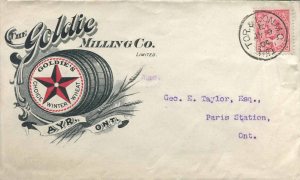http://generations.regionofwaterloo.ca/getperson.php?personID=I115896&tree=generations

Conrad Stroh standing in front of Captain Thomas Smith’s Log House. Image from Region of Waterloo Archives
November 10, 1899 Death of One of the First Settlers of Woolwich On Friday the 13th ult., there died at the home of his son George east of the village of Conestogo, Mr. Conrad Stroh, one of the old pioneers of Woolwich. Deceased was born in Lehrbach Hesse Darmstadt, Germany, Oct 3rd, 1811 and was consequently a little over 88 years old when he died. With his three brothers he left the Vaterland and after a voyage of 47 days reached America and came on to Berlin, where he made his home for a short time. Here he was married by Rev. Bindemann, in 1839 to Miss Annie Marie Oswald who shared his joys and sorrows for some 55 years and predeceased him about 5 years. Afterwards he took up land near West Montrose and a little later a couple of miles east of Elmira and finally he got possession of the homestead opposite the junction of the Conestogo and Grand rivers, where by preserving energy and thrift he and his partner in life succeeded in carving out of the rich virgin forest a comfortable home. Here he spent the remainder of his life with the exception of a few years prior to the death of his wife when they lived in Conestogo. Deceased enjoyed robust health until about a year and a half ago when he had a severe attack of the grippe from which he recovered but which left him in much feebler condition. A few weeks ago he was taken sick and gradually sank until released by death. During this time he had the best attention and care from his son and daughter-in-law for which he expressed his gratitude during his last days. Deceased possessed many good qualities and as a mark of esteem his remains were followed to their last resting place in the Lutheran cemetery at Conestogo by a large concourse of relatives, neighbours and friends. He was one of the founders and a life long member of the Lutheran congregation at Conestogo [St. Matthews] and a staunch Liberal in politics. He leaves behind him four sons and two daughters, all married, 28 grandchildren and 10 great grandchildren also three brothers, Yost of Woolwich aged about 77 years, Henry of Waterloo aged 81 years and John of Berlin aged nearly 91 years. Woolwich at the Turn of the Century:1900, (Woolwich Historical Foundation, Woolwich Township, Ontario, Canada, October 2001), p. 42 _____________________________________ CONRAD STROH was one of the mighty hunters of by-gone days. He lived on the banks of the Grand River, about one mile east of Conestogo, and died at the good old age of 87 some eight years ago. Conrad was an unerring marksman, and when he pulled the trigger of the old flint lock the bullet sped with undeviating accuracy to the objective point. A friend and companion of Conrad’s was Jacob Benner, of West Montrose, who was also a Nimrod who had won his reputation by practical and visible results. He, too, was a keen-sighted marksman and prided himself on never missing his aim. Although the two were fast friends there existed a little good-natured rivalry between them regarding the supremacy of marksmanship. One day a test of skill was determined on. Each was to fire at a spot on a certain. tree. Both fired, but on examination only one bullet hole was found. Both claimed it, and a dispute arose which cooled their friendship and threatened an open rupture. In those days the settlers made their own bullets and lead was scarce. Some days afterwards Benner, passing the spot where the trial had taken place, thought to save the lead by cutting out the ball embedded in the tree. Imagine his surprise when he found both bullets in the one hole. Benner communicated the discovery to his friend and the warm comradeship was resumed that was never afterwards broken. Chronicle-Telegraph Newspaper, 100 Years of Progress in Waterloo County Canada Semi-Centennial Souvenir 1856-1906 (Waterloo, Ontario, Canada: Chronicle-Telegraph Newspaper, 1906) pg 26




